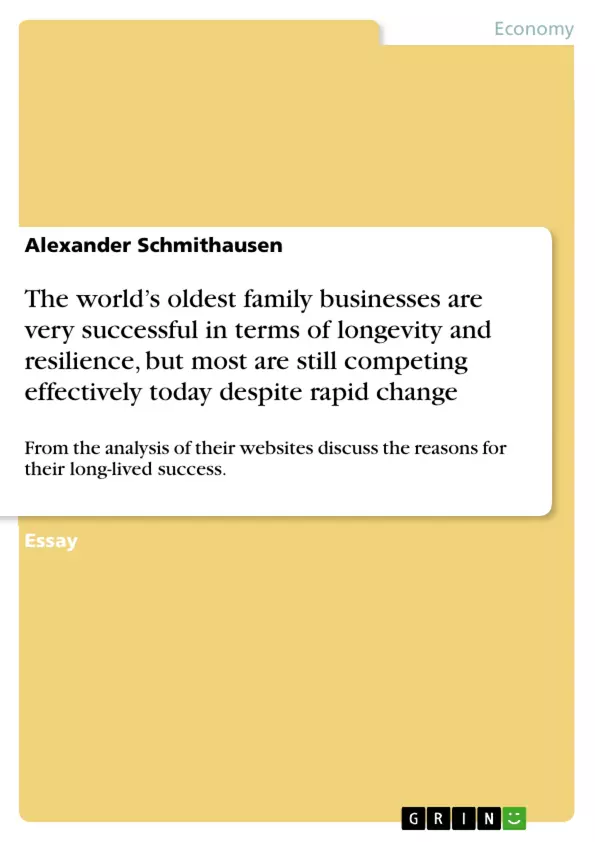The reasons of the successful longevity of many family businesses compared to the short life span of others are not far different from the reasons that glue together family members in a tied long-term relationship. In fact, especially after some generations, when the numbers of members would grow, blood linkages are not enough to guarantee the continuity of the relationship among family members. What makes family relationship last longer are shared values and sense of belonging. In our analysis of three well-established companies, Arco, Musgrave group and Berry Bro & Rudd Limited, we noticed that also family companies’ longevity secret lies in these same principles that maintain together family members through different generations. Adopting family values and extending them to the company culture will determine the long-term survival of family relationship with the business. In the three companies we examined the internal understanding of family’s values appear to define the entire organization’s behaviours.
Table of Contents
- Arco
- Coase (1937): Transaction Costs and Firms
- Jensen and Meckling (1976): The Principal-Agent Problem
- Agency Theory and Family Firms
- Stewardship Theory and Family Firms
- Family Business and Succession Planning
- Corporate Culture and Familiness
Objectives and Key Themes
This essay explores the longevity and success of long-lived family businesses, specifically using the example of Arco, a British company that has been in existence for almost 130 years. It analyzes the reasons for their enduring success, examining the role of family ownership, corporate culture, and the management of potential agency problems within the context of family businesses.
- The role of transaction costs and agency theory in explaining the existence of firms and the behavior of shareholder-owned companies.
- The application of agency theory and stewardship theory to understand how family businesses manage the principal-agent problem.
- The importance of succession planning and the impact of family relationships on the management of family businesses.
- The significance of building a distinctive corporate culture and the concept of “familiness” in family firms.
Chapter Summaries
- The essay starts by introducing the concept of transaction costs as proposed by Coase (1937) to explain why firms exist. This framework is then used to analyze the principal-agent problem, which arises in shareholder-owned companies due to the divergence of interests between shareholders (principals) and managers (agents).
- The essay then explores how agency theory and stewardship theory apply to family businesses, specifically focusing on how the involvement of family members in management can both mitigate and exacerbate agency problems. The importance of succession planning in family businesses is also discussed.
- The essay concludes by examining how Arco, as a family business, has built a distinctive corporate culture that incorporates “familiness” – a combination of family values and business principles. The essay argues that this unique culture contributes to Arco's enduring success and competitive advantage.
Keywords
This essay focuses on key themes such as family business, longevity, corporate culture, transaction costs, agency theory, stewardship theory, principal-agent problem, succession planning, and “familiness”.
Frequently Asked Questions
What is the secret to the longevity of family businesses?
Shared values, a sense of belonging, and a strong corporate culture that extends family values to the business are key to long-term survival.
What is the "Principal-Agent Problem" in family firms?
It refers to the divergence of interests between owners and managers, which family firms can often mitigate through stewardship and direct involvement.
What does the term "familiness" mean?
Familiness is the unique bundle of resources and capabilities a firm has because of the interaction between the family and the business.
Why is succession planning critical for family businesses?
Effective succession planning ensures the continuity of family values and leadership across generations, preventing internal conflicts.
What companies are analyzed in this study?
The study examines well-established companies such as Arco, the Musgrave Group, and Berry Bros & Rudd Limited.
- Arbeit zitieren
- Alexander Schmithausen (Autor:in), 2012, The world’s oldest family businesses are very successful in terms of longevity and resilience, but most are still competing effectively today despite rapid change, München, GRIN Verlag, https://www.hausarbeiten.de/document/199987


